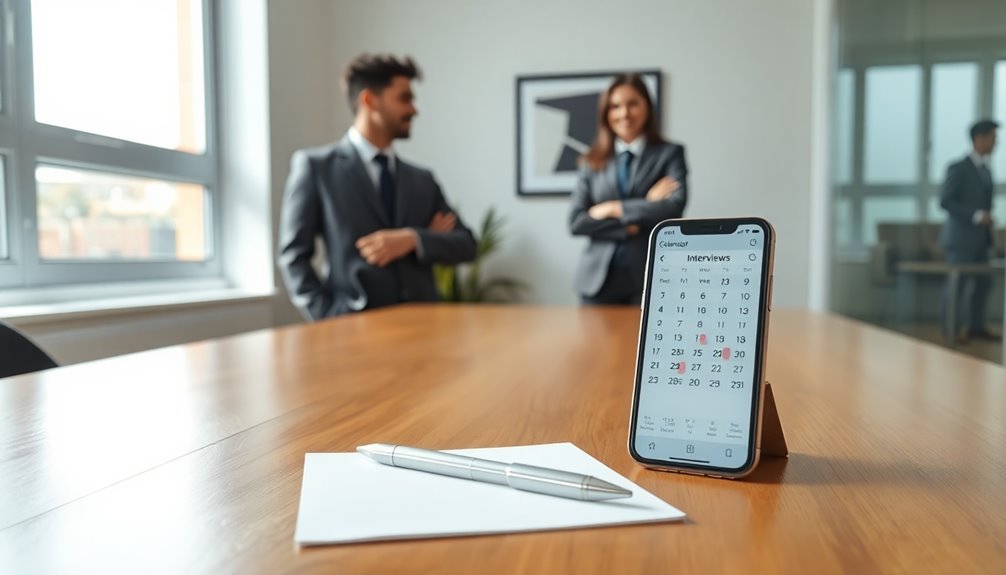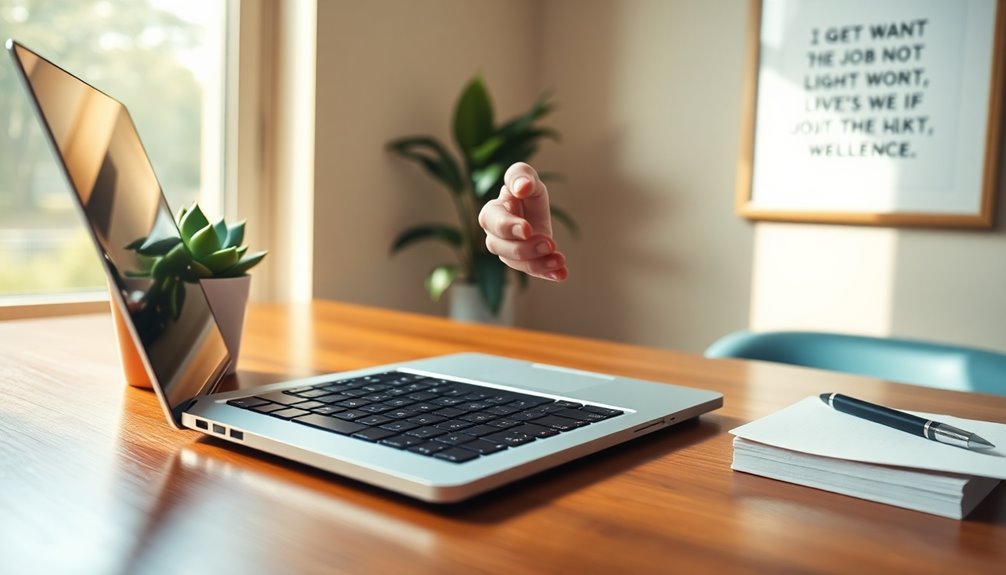To ace your director of business development interview, you need to be well-prepared and confident. Begin by researching the company's values and current challenges, tailoring your resume to highlight your relevant achievements. Dress in a professional manner to make a strong first impression, and master the STAR method to answer behavioral questions effectively. Don't forget the power of insightful questions—they show your genuine interest in the role and the company. Each step builds your confidence and enhances your performance, setting you apart from other candidates. Stick around, and you'll uncover more surprising strategies to boost your interview success.
Key Takeaways
- Research the company's recent developments and challenges to tailor your responses and demonstrate your strategic understanding during the interview.
- Use the STAR method to structure your answers, highlighting specific achievements and the impact of your actions in past roles.
- Practice mock interviews to refine your responses and receive feedback, boosting your confidence and performance on interview day.
- Dress in professional attire to create a strong first impression and convey your seriousness about the role.
- Prepare insightful questions that reflect your understanding of the company's goals and culture, showcasing your genuine interest in the position.
Introduction to Job Interviews

Navigating job interviews can feel daunting, but understanding their purpose makes the process smoother. Job interviews are essential for evaluating your fit for a specific role, focusing on both your technical skills and how well you align with the company's culture. Preparation is key; researching the company's values, recent developments, and the competitive landscape allows you to tailor your responses effectively.
Expect to face behavioral interview questions designed to assess your past experiences and decision-making processes. These questions often require you to share specific examples that demonstrate your skills and how you've handled challenges in the past. It's crucial to come prepared with quantifiable achievements that highlight your impact and value to potential employers.
During the interview, effective communication is vital. You should clearly articulate your experiences and answer questions concisely, ensuring your points resonate with the interviewer. Engaging the interviewer with thoughtful questions can also set you apart, showing your genuine interest in the role and the company. Remember, each interview is an opportunity to showcase not just what you can do, but who you are as a professional. Additionally, understanding the importance of preparation can significantly enhance your confidence and performance during the interview process.
Preparing for the Interview

Before you step into the interview, it's crucial to research the company and assess your own experiences. Make sure your resume highlights your achievements and aligns with the position's demands. Also, practice your responses and prepare questions that demonstrate your understanding of the role and the company's challenges. Additionally, understanding the importance of estate planning can provide insights into how the company supports its clients in managing their legal and financial matters.
Research and Self-Assessment
To truly excel in a Business Development interview, you need to dive deep into your research and self-assessment. Start by thoroughly researching the company's market position, recent developments, and key competitors. This will not only sharpen your industry knowledge but also help you tailor your responses to demonstrate how well you understand their business goals.
Next, assess your own skills, strengths, and weaknesses in relation to the Director of Business Development role. Use specific examples from your background to illustrate how your experience aligns with the company's needs. Familiarize yourself with their mission and values, so you can articulate how your personal and professional goals resonate with theirs.
Additionally, leverage networking platforms like LinkedIn to connect with current or former employees. This can provide valuable insights into the company culture and interview expectations, enhancing your preparedness. Finally, prepare quantifiable achievements from your past experiences that showcase your ability to drive business growth and develop strategic partnerships. These will be crucial talking points during the interview, allowing you to clearly convey your potential impact on the organization. Moreover, understanding infrastructure resilience is essential, especially in today's rapidly changing business environment influenced by global events.
Resume and Application Preparation
Once you've completed your research and self-assessment, it's time to focus on your resume and application preparation. Start by tailoring your resume to highlight relevant achievements in business development. Use quantifiable metrics to showcase your impact and success in previous roles—numbers speak volumes.
Ensure you include keywords from the job description throughout your application. This not only aligns your experience with the company's needs but also increases your chances of passing through applicant tracking systems. Format your resume professionally, with clear sections for experience, education, and skills, so hiring managers can quickly identify your qualifications.
Don't forget to showcase specific examples of past projects or initiatives that illustrate your strategic thinking and ability to drive growth, especially in leadership roles.
When crafting your cover letter, incorporate insights from your research about the company. Show your understanding of their market position and how your skills can help meet their objectives. This personalized approach demonstrates genuine interest and sets you apart from other candidates. Prepare thoroughly, and you'll make a powerful impression before the interview even begins.
Interview Preparation Techniques
Effective interview preparation is crucial for standing out in a competitive business development landscape. Start by conducting thorough market research on the company, its position, and any recent developments. This knowledge will help you tailor your responses and showcase your genuine interest in the role.
Next, practice articulating your personal achievements with quantifiable metrics. This isn't just about listing successes; it's about providing concrete evidence of your capabilities, making your case compelling in a data-driven environment.
Prepare for a mix of technical and behavioral questions, emphasizing your strategic thinking, problem-solving skills, and adaptability. Interviewers want to see how you can navigate dynamic environments.
Don't forget to develop insightful questions to ask your interviewer. This reflects your understanding of the company's challenges and goals, demonstrating your proactive approach.
Finally, consider utilizing mock interviews or seeking peer feedback to refine your delivery. This will ensure clarity and confidence when presenting your experiences and vision for the role. By implementing these interview preparation techniques, you'll be well-equipped to impress and stand out as a strong candidate. Additionally, remember that setting clear goals can help you stay focused and organized throughout the interview process.
Dressing for Success
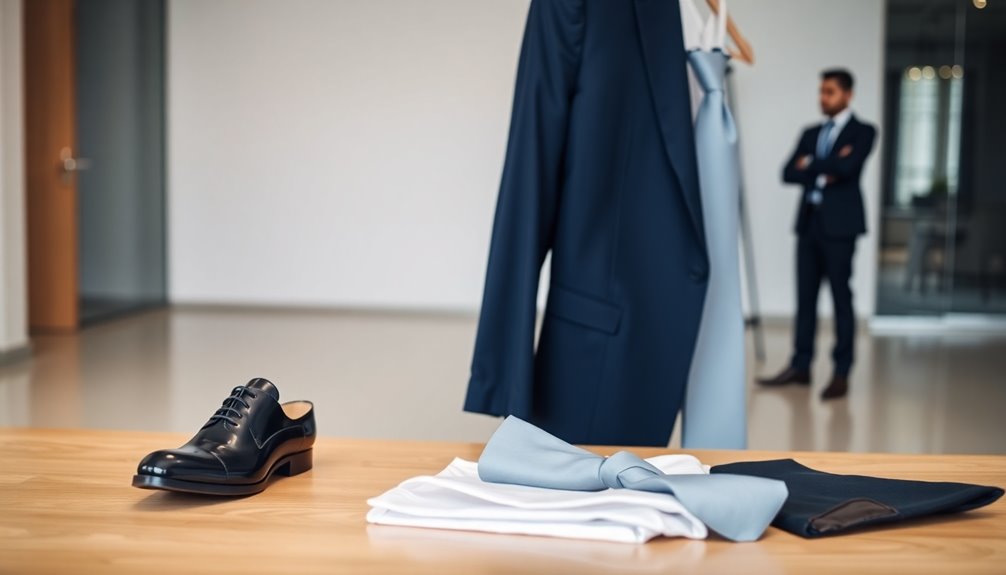
When it comes to dressing for your Director of Business Development interview, your attire can make a significant difference in how you're perceived. A professional look, whether it's a tailored suit for men or women, sets the right tone and conveys authority. Let's explore some general guidelines and tips tailored for both genders to help you nail that first impression. Additionally, consider incorporating essential oils for relaxation into your pre-interview routine to help calm your nerves.
General Attire Guidelines
You want to make a strong impression in your Director of Business Development interview, and your attire plays a crucial role in that. Dressing in professional attire, like a tailored business suit or a well-fitted professional dress, can significantly enhance your first impression. Research shows that 55% of first impressions are based on appearance, so it's important to select clothing that aligns with the company's culture and industry standards.
Opt for conservative colors such as navy, black, or gray, as these shades convey professionalism and authority. Avoid overly casual clothing like jeans or t-shirts to maintain a serious demeanor. Accessories should be minimal and tasteful; think simple jewelry and a professional-looking watch that won't distract from your overall look.
Footwear is just as important. Choose polished shoes—men should wear dress shoes, while women can opt for closed-toe heels or flats. This choice not only completes your outfit but also ensures you project comfort and professionalism. By following these general attire guidelines, you'll be well on your way to acing that interview and making a lasting impact.
Gender-Specific Attire Tips
Confidence plays a vital role in how you're perceived during a business development interview, and the right attire can significantly boost that confidence. For men, opting for a tailored suit in neutral colors like navy, gray, or charcoal sets the tone for professionalism and authority. Pair it with a crisp white shirt and a conservative tie to enhance your overall look.
For women, consider wearing a well-fitted blazer over a blouse with tailored pants or a knee-length dress. This combination strikes a balance between professionalism and personal style, maintaining an authoritative presence. Remember, footwear matters too; choose polished leather dress shoes if you're a man, or closed-toe heels or flats if you're a woman, ensuring comfort for those potentially long interview durations.
When it comes to accessories, keep them minimal and understated. A classic watch or simple jewelry can enhance your look without distracting from your professional image. Research shows that first impressions are formed within the first seven seconds, so dressing appropriately is crucial to create a positive and lasting impact. With the right attire, you'll convey the professionalism and authority needed to ace your interview.
Seasonal and Casual Attire
Choosing the right attire goes beyond just looking professional; it also means adapting to the season and the specific company environment. For a Director of Business Development interview, you should aim for attire that conveys professionalism and confidence. In formal settings, tailored suits are ideal, while business casual options can be suitable for more relaxed company cultures.
Consider the season when selecting your outfit. During warmer months, opt for lighter materials and brighter colors to stay comfortable and visually appealing. In contrast, heavier fabrics and darker tones work well in cooler seasons. Researching the company culture can guide your choices—startups may favor casual wear, whereas established corporations typically lean towards traditional business attire.
Don't forget about accessories; keep them minimal and elegant. A classic watch or subtle jewelry can enhance your look without being distracting. Footwear also plays a crucial role in making first impressions, so ensure your shoes are polished and appropriate for your outfit. By carefully considering your attire and its alignment with company culture, you'll set a strong foundation for success in your interview. Additionally, remember that sharing parenting responsibilities can also teach valuable lessons in teamwork and collaboration, which are essential in business development roles.
Mastering Interview Questions

When you're preparing for a business development interview, mastering common and behavioral questions is crucial. You'll want to showcase your experience and problem-solving skills with clear, impactful responses. By tailoring your answers to the company's needs, you can demonstrate your value and alignment with their goals. Additionally, establishing healthy boundaries during the interview process can help you communicate your needs and expectations effectively.
Common Interview Questions
Five common interview questions can help you prepare for a Director of Business Development position. First, you might be asked about your motivation for pursuing this role. Be ready to discuss your passion for driving growth and how you envision becoming a successful business development director. Next, interviewers often inquire about your relevant qualifications and past experiences. Highlight specific strategies you employed to identify growth opportunities and how those initiatives impacted market share.
Another common interview question revolves around your understanding of the distinction between business development and sales. Be clear about how your role in forging strategic partnerships differs from traditional sales efforts. You may also need to explain how you manage and lead teams to achieve business objectives.
Lastly, be prepared to articulate your vision for your future career, especially how it aligns with the company's long-term goals. Interviewers want to see that you can adapt your strategies based on consumer behavior insights and market trends. Mastering these common interview questions will set you up for success in your upcoming interviews.
Behavioral and Situational Questions
Preparing for behavioral and situational questions is key to demonstrating your fit for a Director of Business Development role. Behavioral questions often focus on your past experiences. You'll need to provide specific examples of how you handled challenges, led teams, or achieved goals in previous roles. Situational questions, on the other hand, assess how you would approach hypothetical scenarios, emphasizing your problem-solving skills and strategic thinking relevant to business development.
To effectively tackle these questions, use the STAR method—Situation, Task, Action, Result. This technique helps you structure your responses clearly and impactfully. For instance, if asked about overcoming objections, describe a specific situation where you successfully navigated a challenging client discussion.
Prepare for common themes in business development interviews, such as driving revenue growth and fostering partnerships. Practicing your responses to these behavioral and situational questions can significantly boost your confidence and improve your overall interview performance. By doing so, you'll come across as more relatable and memorable to interviewers, making it easier for them to envision you in the role. Additionally, understanding the importance of continuous integration can enhance your approach to collaboration and project management in business development contexts.
Industry-Specific Questions
Mastering industry-specific questions can make all the difference in your business development interview. These questions often focus on your understanding of market dynamics and the competitive landscape relevant to the role. Be prepared to discuss your experience with unique growth opportunities, highlighting specific strategies you've used to drive results.
Interviewers want to know how you approach building partnerships within the industry. Emphasize the importance of trust and collaboration in achieving mutual goals. Your ability to articulate how your past achievements align with industry standards is crucial. Provide quantifiable metrics to illustrate your success in previous initiatives.
Additionally, familiarize yourself with industry-specific challenges, such as regulatory considerations or market entry barriers. This knowledge can set you apart, allowing you to display a proactive approach to problem-solving. By demonstrating your understanding of these elements, you show that you're not just a candidate, but a strategic thinker who's ready to tackle the complexities of the industry.
Moreover, understanding the value of high-quality content can enhance your communication skills and make your responses more impactful. Prepare for these industry-specific questions, and you'll position yourself as a strong contender for the director of business development role.
Advanced Question Techniques
Understanding industry-specific questions is only part of the interview process; you also need to tackle advanced question techniques effectively. In a business development role, you'll likely face behavioral questions that require you to demonstrate your analytical skills and problem-solving abilities. Use the STAR method—Situation, Task, Action, Result—to structure your responses. This approach helps you convey a clear track record of achievements relevant to the position.
Prepare for situational questions by researching common challenges in business development. Formulate strategic responses that highlight your ability to make sound strategic decisions and navigate obstacles. Expect inquiries about your leadership style and experience managing teams. Showcase how you motivate and guide others toward achieving business goals.
Additionally, practice articulating your unique value proposition when asked what sets you apart from other candidates. Focus on quantifiable achievements and specific skills that directly relate to the role. Engaging in mock interviews with industry peers or mentors can refine your answers and improve your confidence. This preparation ensures you present yourself as a strong candidate ready to excel in the director of business development position. Furthermore, demonstrating your knowledge of high-quality content can enhance your credibility during the interview process.
Asking Insightful Questions

Asking insightful questions not only shows your knowledge but also your genuine interest in the role. Focus on strategic inquiries that reveal the company's goals and challenges, and don't shy away from closing questions that clarify expectations. This approach helps you align your skills with their needs, making a strong impression during your interview.
Strategic Questions to Impress
During your business development interview, posing strategic questions can set you apart from other candidates. Start by asking about the company's current growth strategy. This demonstrates your understanding of the business landscape and shows you're eager to align with the company's goals. Inquire about the key performance indicators (KPIs) they use to measure success in the business development department. This reflects your analytical mindset and focus on results.
Next, request insights into the biggest challenges the company faces. This highlights your problem-solving approach and eagerness to contribute solutions. You can also ask how the business development team collaborates with other departments. This emphasizes your appreciation for cross-functional teamwork and the importance of collaboration in achieving shared objectives.
Finally, probing into the company's approach to emerging market trends reveals your awareness of the dynamic business environment. It shows you're committed to staying ahead of the competition, a critical trait for a director of business development. By asking these strategic questions, you not only gather valuable information but also leave a lasting impression on your interviewers.
Closing Questions
Leaving a strong impression in a business development interview goes beyond answering questions effectively; it also hinges on the insightful questions you ask. By inquiring about the company's strategic goals for the upcoming year, you demonstrate your understanding of aligning business development efforts with the organization's broader objectives. This shows you're not just looking for a job but are genuinely interested in contributing to the company's long-term growth.
Don't shy away from asking about team dynamics and company culture. These business development interview questions reveal how well you might fit into the organization and help you gauge the collaborative environment. You want to ensure that you can thrive alongside your future colleagues.
Additionally, ask about the metrics used to measure success in the business development department. This reflects your results-oriented mindset and focus on performance. Finally, inquire about the potential challenges the team currently faces. This question positions you as a proactive problem-solver and gives you insight into how you can contribute from day one. By engaging in this dialogue, you'll leave a lasting impression and set yourself apart from other candidates.
Effective Communication and Presentation

When it comes to effective communication in your business development interview, crafting the perfect response is key. Your body language and confidence play a huge role in how your message is received, so make sure to project assurance as you speak. Remember, the way you present your ideas can set you apart from other candidates.
Crafting the Perfect Response
Crafting a compelling response in a business development interview hinges on effective communication and presentation skills. To stand out, tailor your answers to highlight specific examples of your achievements, focusing on quantifiable metrics that demonstrate your impact. Use the STAR method—Situation, Task, Action, Result—to structure your responses clearly, showcasing your problem-solving capabilities while discussing your business development approach.
Active listening is crucial, as it allows you to engage with the interviewer and respond thoughtfully to their questions. This not only reflects your negotiation skills but also showcases your ability to communicate effectively. When discussing your business development strategies, articulate your thought process and the rationale behind your decisions, which illustrates your analytical abilities.
Incorporating emotional intelligence into your responses is a game-changer. Acknowledge the importance of collaboration and relationship-building in business development, emphasizing how your interpersonal skills enable you to connect with clients and stakeholders. This focus on emotional intelligence can set you apart from other candidates, making your responses more impactful and memorable.
Body Language and Confidence
Body language plays a crucial role in conveying confidence during a business development interview. Effective body language, like maintaining eye contact and adopting open postures, significantly enhances your presence. It makes you appear more trustworthy and engaged, which is essential in an interview setting. Remember, studies show that 55% of communication is non-verbal, so your gestures, facial expressions, and overall demeanor are key to demonstrating your enthusiasm and suitability for the role.
Before the interview, consider practicing power poses. Research indicates that these expansive body language techniques can elevate your feelings of power and reduce stress levels, boosting your confidence. Additionally, the tone and clarity of your voice are vital for effective communication. Speak at a measured pace and vary your pitch to keep the interviewer engaged while showcasing your passion for the role.
Finally, consistent practice in front of a mirror or recording yourself can refine both your body language and verbal communication skills. This preparation allows you to project confidence and professionalism, ultimately enhancing your chances of acing the interview. Embrace these non-verbal cues, and let your body language speak volumes.
Post-Interview Strategies
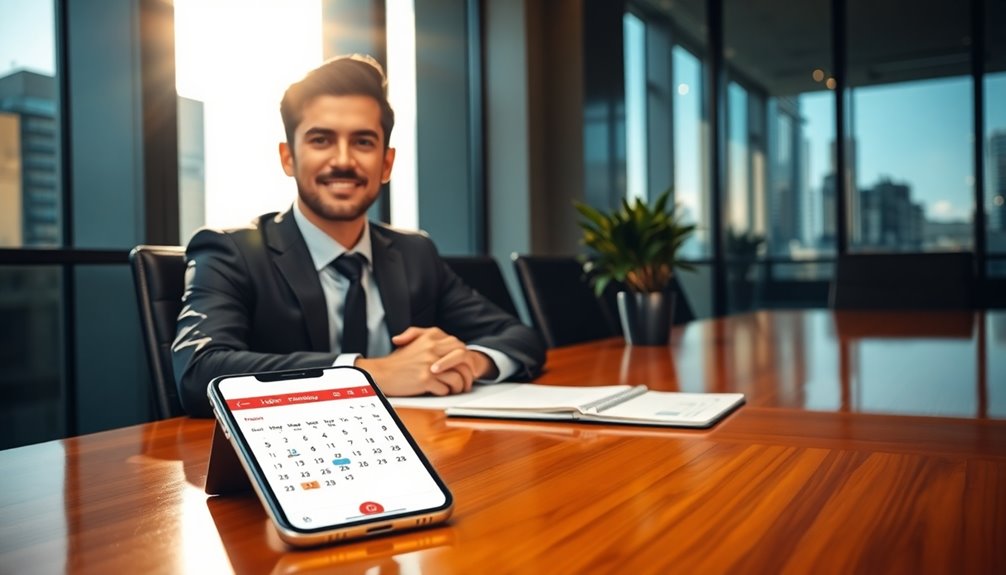
After your interview, it's crucial to follow up with a personalized thank-you email to reinforce your interest and make a lasting impression. You'll also want to reflect on your performance and be prepared for handling offers or rejections gracefully. These post-interview strategies can set you apart and keep you ready for future opportunities.
Follow-Up Communications
A well-timed thank-you email can leave a lasting impression after your business development interview. Send this email within 24 hours, expressing gratitude for the opportunity and reiterating your enthusiasm for the role. Make it personal by referencing specific points from the interview; this shows you were attentive and reinforces your suitability for the position.
Use the follow-up message to address any questions or concerns that came up during the interview. Providing additional information or clarification demonstrates your proactive approach and commitment to the role.
Additionally, consider connecting with your interviewers on professional networking platforms like LinkedIn. This step helps maintain ongoing communication and fosters rapport, which could be beneficial for your candidacy.
If you haven't heard back within the timeframe discussed during the interview, don't hesitate to send a polite follow-up email. Inquire about the status of your application, and remind them of your interest in the position. This shows your eagerness and keeps you top-of-mind as they continue the decision-making process.
Handling Offers and Rejections
Receiving a job offer can be both exciting and overwhelming. Before you accept, take a moment to evaluate the entire compensation package. Look beyond the base salary—consider bonuses, benefits, and growth opportunities. Make sure it aligns with your career goals and personal needs.
If you choose to reject an offer, express gratitude for the opportunity. A brief rationale for your decision helps maintain a positive relationship, which could lead to future opportunities with the organization. Always remember to follow up within 24-48 hours with a thank-you note, reiterating your interest in the position and the organization.
In the event of a rejection, don't hesitate to request constructive feedback from your interviewer. This insight can highlight areas for improvement and boost your chances in future interviews.
Stay proactive by continuing to network and explore other opportunities. Keeping momentum in your job search can lead to unexpected offers and valuable connections in the industry. Handling offers and rejections with professionalism and positivity not only enhances your reputation but also paves the way for future success.
Emerging Interview Technologies
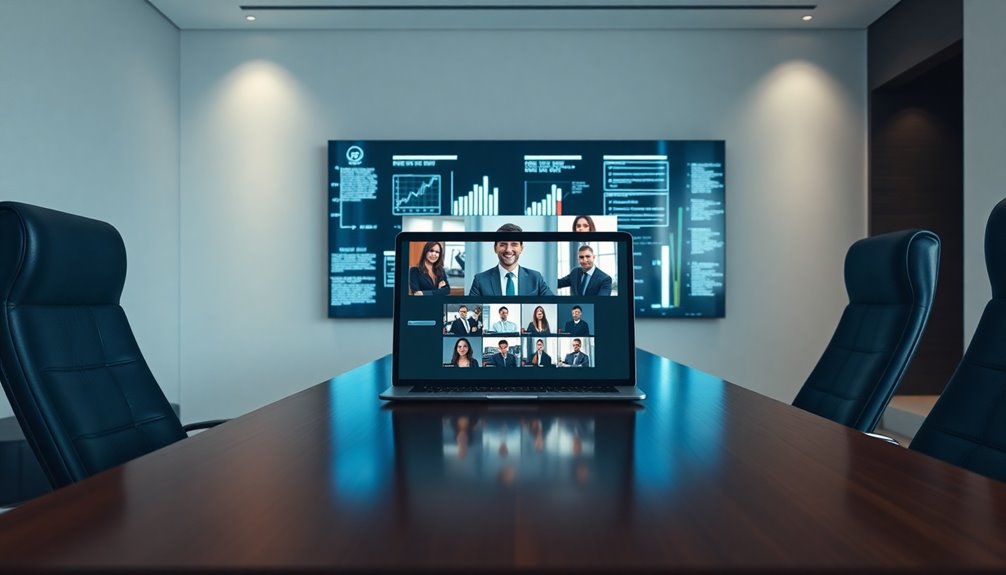
As remote interviews become the norm, you need to stay updated on the latest technologies shaping this process. Understanding local dialects can give you an edge, especially in virtual settings where communication nuances matter. Plus, exploring virtual reality interviews can help you showcase your skills in a dynamic way that stands out to hiring managers.
Remote Interview Technology Trends
Emerging technologies are transforming how remote interviews are conducted, making the process more efficient and engaging for both candidates and employers. Today, remote interviews increasingly leverage AI tools to assess your responses in real-time. Platforms like HireVue analyze facial expressions and word choice to gauge your emotional intelligence and personality traits, giving employers deeper insights.
Video conferencing applications, such as Zoom and Microsoft Teams, enhance the experience with features like virtual backgrounds and breakout rooms, allowing for dynamic interactions. Asynchronous video interviews also let you record your answers to pre-set questions at your convenience, which can reduce bias and streamline the hiring process.
Advanced analytics in remote interview technology enable companies to track and analyze candidate performance data across multiple interviews. This data helps refine selection criteria and improve hiring strategies. Furthermore, the adoption of augmented reality (AR) and virtual reality (VR) is on the rise, with 30% of companies exploring these tools to simulate real-world job scenarios. This immersive approach can effectively assess your problem-solving abilities, making remote interviews not just a trend, but a powerful tool in the hiring landscape.
Local Dialect Awareness
When preparing for a business development interview, being aware of local dialects can set you apart from other candidates and enhance your communication effectiveness. Demonstrating local dialect awareness shows cultural sensitivity and a deeper understanding of market nuances, which are crucial in a Director of Business Development role.
Incorporating regional dialects in your communication can significantly improve rapport with clients and stakeholders. This relationship-building approach fosters trust and makes you more relatable. Candidates who exhibit this awareness often stand out in interviews, as they're perceived as attuned to the subtleties of the local market.
With emerging interview technologies, like AI-driven language processing tools, you can analyze your speech patterns and dialect usage. This feedback can help refine your communication style, ensuring you adapt effectively during virtual interviews.
Additionally, practicing with virtual reality tools can simulate real-world scenarios, allowing you to refine your use of local dialects and cultural references in a controlled environment. By prioritizing local dialect awareness, you'll not only enhance your interview performance but also position yourself as a candidate who understands the intricacies of the market.
Interviewing via Virtual Reality
Virtual reality (VR) interviews are revolutionizing the way candidates showcase their skills and connect with potential employers. This emerging recruitment technology offers an immersive experience that allows you to demonstrate your abilities in a simulated work environment. Unlike traditional interviews, VR can significantly reduce interview anxiety by familiarizing you with the setting, leading to more authentic responses and improved performance.
Companies like Accenture and PwC are already leveraging VR to assess candidates' problem-solving skills and adaptability in realistic scenarios. This approach not only enhances engagement but also allows you to showcase your strategic thinking and creativity in a way that stands out. Picture interacting with 3D environments relevant to the business development role—this is your chance to shine!
Moreover, VR interviews streamline the process, enabling companies to connect with talent from diverse geographical locations without the constraints of in-person meetings. By embracing this innovative method, you position yourself as a forward-thinking candidate ready to tackle the challenges of modern business development. So, gear up and get ready to take your interview experience to the next dimension!
Confidence and Mindset

When you walk into that interview room, building unshakeable confidence is key to making a lasting impression. By employing inspirational strategies like affirmations and visualization, you can elevate your mindset and approach challenges with optimism. Remember, viewing the interview as a conversation rather than an interrogation can also help you engage more authentically and showcase your skills effectively.
Building Unshakeable Confidence
Confidence plays a crucial role in acing a business development interview, and building unshakeable confidence requires a mix of preparation and mindset. Start by thoroughly preparing for the interview. Practice your responses to common questions and research the company's culture and market position. This preparation helps you articulate your unique value, showcasing your strengths in building relationships and driving growth.
Adopting a growth mindset is also essential. Embrace challenges and view setbacks as opportunities to learn and improve. This perspective will enhance your confidence during high-stakes interviews. Additionally, visualization techniques can help. Imagine successful interview scenarios and positive outcomes to reduce anxiety and boost your self-assurance.
Engaging in mock interviews with peers or mentors can provide valuable feedback, reinforcing your ability to communicate your experiences effectively. This practice not only sharpens your answers but also builds confidence as you see yourself articulating your achievements. Remember, understanding and expressing your unique value proposition, supported by quantifiable past successes, will clarify your contributions during the interview process. With thorough preparation and a growth mindset, you'll cultivate the unshakeable confidence needed to excel.
Inspirational and Motivational Strategies
Many people find that nurturing a positive mindset and drawing inspiration from their experiences can significantly enhance their performance in business development interviews. Cultivating a growth mindset is essential; it allows you to embrace challenges and persist through setbacks. This resilience is key in high-stakes environments. Additionally, practicing visualization techniques can boost your confidence. Mentally rehearsing successful outcomes not only prepares you but also improves your actual performance during interviews.
Incorporating positive affirmations into your daily routine can elevate your self-esteem and resilience. Studies show that those who use affirmations experience increased confidence and reduced stress levels, making you a more compelling candidate. Don't underestimate the power of mindfulness, either. Engaging in stress management techniques, such as meditation or deep breathing, sharpens your focus and clarity, helping you articulate your skills effectively.
Finally, surround yourself with a supportive network of mentors and peers. Their encouragement and constructive feedback can foster motivation and enhance your resilience. Remember, the right mindset and support can make all the difference in nailing your business development interview. Embrace these strategies, and watch your confidence soar!
Practice Mock Interviews Regularly

Practicing mock interviews regularly is key to fine-tuning your responses and boosting your confidence. By simulating different interview styles and scenarios, you can identify essential items and preparation steps that will set you apart. Don't forget to focus on final preparation steps, ensuring you're ready to impress when the real opportunity comes.
Essential Items and Preparation
Regularly conducting mock interviews is crucial for anyone preparing for a Director of Business Development role. These practice sessions allow you to refine your responses and build confidence in articulating your relevant experiences and qualifications. By tackling a variety of interview questions, including technical and behavioral queries, you're better equipped for the diverse topics that may arise during the actual interview.
Utilizing feedback from these mock interviews is essential. It helps you identify areas for improvement and lets you tailor your responses to align with what interviewers expect. Engaging in role-playing exercises with peers or mentors simulates real interview pressures, enhancing your adaptability to unexpected questions.
Don't overlook the importance of recording and reviewing your practice sessions. This strategy enables you to assess your body language and communication style, ensuring you present yourself professionally. By focusing on these essential items and preparation techniques, you'll not only improve your interview skills but also boost your chances of landing that coveted Director of Business Development position. Regular mock interviews are your secret weapon in navigating this competitive landscape successfully.
Final Preparation Steps
Engaging in mock interviews is a vital step in your final preparation for a Director of Business Development position. These practice sessions allow you to articulate experiences clearly, ensuring you convey your qualifications effectively. By simulating actual interview situations, you'll become more comfortable with potential questions, helping you navigate unexpected challenges with ease.
Role-playing with peers or mentors offers diverse perspectives, enhancing your ability to think critically about your answers and align with the company's objectives. Recording your mock interviews provides valuable feedback on body language, tone, and clarity, allowing you to make necessary adjustments before the real interview.
The more consistent you are with these mock interviews, the better your performance will be. You'll refine your responses to common interview questions, boosting your confidence and readiness. Remember, this practice isn't just about memorizing answers; it's about developing a conversational style that feels natural.
Ultimately, investing time in mock interviews can significantly increase your chances of success, setting you apart as a candidate who's not only prepared but also aligned with the goals of the organization. So, get started and watch your confidence soar!
Effective Questioning Techniques

Mastering effective questioning techniques is crucial for a successful business development interview. Start by utilizing open-ended questions. They encourage detailed responses, revealing insights into the company's culture and expectations for the role. You want candidates to share their thoughts freely, so avoid yes-or-no questions.
Next, prepare situational questions that assess how candidates would handle specific challenges in business development. This allows you to gauge their problem-solving abilities and strategic thinking. Don't forget to incorporate probing questions that follow up on their answers. This deepens the conversation and clarifies their thought processes, showcasing your engagement.
Consider using hypothetical scenarios related to the company's goals. This tests the candidate's creativity and adaptability in developing business strategies. For instance, ask them how they'd approach a new market entry or a potential partnership.
Finally, ask about their experiences with cross-functional collaboration. Understanding how candidates work with diverse teams and manage relationships effectively is essential in the business development landscape. By employing these effective questioning techniques, you'll not only gather valuable information but also create a dynamic dialogue that reflects your expertise in the field.
Summarize Interview Preparation Tips

Preparing for a business development interview involves several key steps that can significantly enhance your chances of success. First, conduct thorough market research to understand the industry landscape and the company's strategic goals. This knowledge helps you tailor your responses to align with their culture and objectives.
Next, practice answering common interview questions, focusing on quantifiable past achievements. Be ready to share specific metrics that highlight your impact in previous roles, demonstrating the value you can bring to the organization.
Additionally, think about how your career goals align with the company's mission and recent developments in the industry. This alignment shows you're not just looking for any job, but a meaningful opportunity that fits both parties.
Finally, prepare insightful questions to ask the interviewer. These shouldn't just be surface-level inquiries; instead, reflect your understanding of the company's competitive positioning and current challenges. This not only showcases your preparation but also your genuine interest in contributing to their success. By following these tips, you'll be well-equipped to impress during your interview and stand out as a candidate.
Encouragement and Final Thoughts

You've done the groundwork to prepare for your business development interview, and now it's time to embrace the opportunity ahead. Remember, your passion for business development can truly set you apart. When you express genuine enthusiasm, it leaves a lasting impression on interviewers. Use storytelling to weave your experiences into compelling narratives that highlight your past achievements. Share specific examples with quantifiable metrics to demonstrate your value and persistence in overcoming challenges.
Keep in mind that your contributions should extend beyond just the company. Articulate how your work will positively impact clients and foster your personal growth. This well-rounded perspective not only showcases your commitment but also reinforces your potential as a leader in business development.
Stay confident and focused during your interview. With your preparation, you're equipped to convey your passion and achievements effectively. Embrace this chance to share your story and make authentic connections. Remember, each conversation is a step toward your goals. With encouragement from your preparation and the passion you bring, you're ready to ace this interview and embark on a rewarding journey in business development. Good luck!
Frequently Asked Questions
How to Pass a Business Development Interview?
To pass a business development interview, you need to prepare thoroughly. Research the company's market position, industry trends, and competitors to align your answers with their strategic goals. Bring quantifiable achievements from previous roles to showcase your impact. Practice common interview questions, emphasizing your problem-solving and teamwork skills. Prepare insightful questions about their strategies, and connect your motivations to the company's mission, demonstrating your emotional intelligence and genuine interest in the role.
How to Crack a BDE Interview?
To crack a business development interview, you need to showcase your industry knowledge and relevant achievements. Research the company's market position and prepare specific examples that highlight your ability to drive growth. Articulate your motivation for the role, aligning your goals with the company's mission. Practice answering common behavioral questions to demonstrate your problem-solving skills. Lastly, leverage your network for insights on the company culture, helping you tailor your responses effectively.
How Do You Ace a Director Interview?
To ace a director interview, start by researching the company's market and strategic goals. Tailor your responses to align with their objectives. Prepare to showcase quantifiable achievements that demonstrate your ability to drive growth. Articulate your leadership style clearly, emphasizing team motivation and collaboration. Be ready to discuss your approach to business development plans and how you identify growth opportunities, while highlighting your adaptability in negotiations and relationship-building skills.
How to Nail a Business Development Representative Interview?
To nail a business development representative interview, focus on showcasing your understanding of the role's strategic nature. Highlight your achievements in generating leads and closing deals, using specific metrics to illustrate your impact. Share examples of how you analyze market trends to inform your strategies. Additionally, demonstrate your persistence in overcoming challenges and articulate your passion for building relationships, showing how eager you are to contribute to the company's success.
Augustus is the visionary leader and Editor-in-Chief of Personality-Test.net. With an unwavering commitment to quality and authenticity, he oversees all content, ensuring it enlightens and empowers our audience. Augustus believes deeply in the transformative power of self-awareness and is dedicated to making Personality-Test.net a beacon for those on a journey to understand themselves better.

